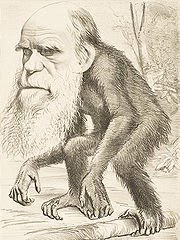
The complete text of The origin of species
A good introduction to The origin of species at Wikipedia
Summary of Darwin's theory
Darwin pictured shortly after publication
Darwin's theory is based on key facts and inferences drawn from them, which biologist Ernst Mayr summarised as follows:[1]
* Every species is fertile enough that if all offspring survived to reproduce the population would grow (fact).
* Despite periodic fluctuations, populations remain roughly the same size (fact).
* Resources such as food are limited and are relatively stable over time (fact).
* A struggle for survival ensues (inference).
* Individuals in a population vary significantly from one another (fact).
* Much of this variation is inheritable (fact).
* Individuals less suited to the environment are less likely to survive and less likely to reproduce; individuals more suited to the environment are more likely to survive and more likely to reproduce and leave their inheritable traits to future generations, which produces the process of natural selection (inference).
* This slowly effected process results in populations changing to adapt to their environments, and ultimately, these variations accumulate over time to form new species (inference).
Natural selection
There were serious scientific objections, including Karl von Nägeli's insistence that a trivial characteristic with no adaptive advantage could not be developed by selection. Darwin conceded that these could be linked to adaptive characteristics. His estimate of the age of the Earth was disputed by William Thomson (later awarded the title Lord Kelvin), who calculated that it had cooled in less than 100 million years. Darwin accepted blending inheritance, but Fleeming Jenkin calculated that as it mixed traits, natural selection could not accumulate useful traits. Darwin tried to meet these objections in the 5th edition. Mivart supported directed evolution, and compiled scientific and religious objections to natural selection. In response, Darwin made considerable changes to the sixth edition. The problems of the age of the Earth and heredity were only resolved in the 20th century.[55][152]
By the mid 1870s, most scientists accepted evolution, but relegated natural selection to a minor role as they believed evolution was purposeful and progressive. The range of evolutionary theories during "the eclipse of Darwinism" included forms of "saltationism" in which new species were thought to arise through "jumps" rather than gradual adaptation, forms of orthogenesis claiming that species had an inherent tendency to change in a particular direction, and forms of neo-Lamarckism in which inheritance of acquired characteristics led to progress. The minority view of August Weismann that natural selection was the only mechanism was called neo-Darwinism. It was thought that the rediscovery of Mendelian inheritance invalidated Darwin's views.[15